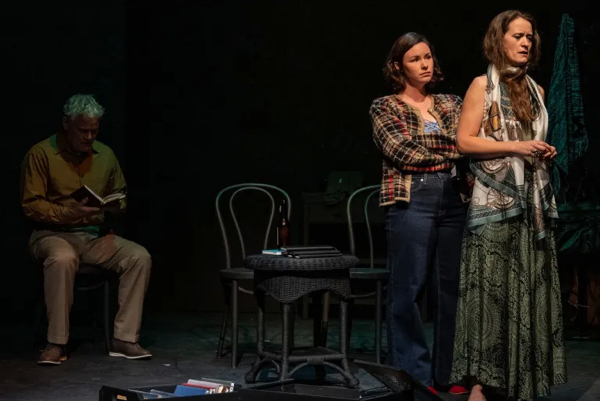
‘Fiction’ at St. Louis Actors’ Studio takes an intriguing look at secrets, mysteries, and the truth
By Michelle Kenyon
I've sometimes thought that if I were ever to write my memoirs, they would have to be at least partially fictionalized. Since life is rarely as dramatic as literature, at least a little embellishment would be necessary in telling my life story. Also, there are real people involved in my story, and I don't own their lives, so fudging to protect privacy would also be needed. In addition to these reasons, imagining what could have happened is often easier, more fun, and sometimes less painful than remembering what really happened. These ideas--of truth vs. fiction in telling our stories and those of others we know--are dealt with in intriguing, highly personal detail in Steven Dietz's relationship drama "Fiction," which explores the marriage of two writers who, upon being faced with mortality, are forced to confront their own secrets, mysteries, and realities in their relationship and in their writings.
The story begins mid-conversation in a café in Paris, where Michael Waterman--played by William Roth, and Linda, played by Lizi Watt--are arguing about music. It's a conversation that establishes the characters' personalities to a degree, and we see the good-natured banter and obvious affection between them. Then, the story flashes forward to the present, in which Michael and Linda are both well-known authors who have been married for 20 years. Linda, who lives in the shadow of her more famous husband and the memory of her celebrated first novel, teaches a college writing class. Michael churns out a series of best-selling novels that keep getting made into movies. They have their concerns and regrets, but they know each other well, and they're happy. That is, they're happy until Linda gets diagnosed with an aggressive brain tumor and is given just weeks to live. In the midst of the pending grief, Linda tells Michael she wants him to read her journals after she dies, and requests to read his. Michael is hesitant, but eventually agrees, and as they say, the plot thickens, as the years and years of diaries contain secrets that Michael hasn't told Linda, involving a young woman that he met at a writers' colony--Abby, played by Bryn McLaughlin. It may appear obvious where this story is going, and in a way, that is where it goes, but in a much bigger way, this story leads back to something less obvious and potentially more devastating. It's a story that challenges not only the Watermans' relationship, but also their identities as writers, and the very ideas of truth and fiction in their lives, as these concepts blend together in mysterious and occasionally confusing ways, leading to some startling revelations and a conclusion that brings the story back to where it began, with a degree of resonance concerning what is to come for the young, unwitting couple.
I've seen a few plays by Steven Dietz, and I think this is most well-constructed, although the characters are hard to like at times--especially Michael. Still, Roth manages to infuse him with enough charm that, as blustery and self-important as he can be, I can understand the connection between him and Linda. Linda, for her part, is much more likable at first, and Watt conveys such an earnestness in her portrayal that makes later revelations all the more surprising. It's a rich, nuanced performance, and the centerpiece of the play. Watt and Roth also display believable chemistry. McLaughlin, in the somewhat mysterious role of Abby, is also excellent, as her motives aren't made obvious at first. McLaughlin is adept at maintaining the mystery until the necessary reveals, playing well against both Roth and Watt with a believable degree of antagonism mixed, occasionally, with admiration.
The staging by director Wayne Salomon is fairly briskly paced, taking just enough time for the drama to play out credibly and with due poignancy, but without dragging. The set, designed by Patrick Huber, is dark and minimal, with a bit of abstraction represented by the vague scribblings painted on the walls, like the mysterious vagaries of a writer's mind. Kristi Gunther's mood-setting lighting adds to the atmosphere of the production, as do Carla Landis Evans's well-suited costumes.
Overall, this is a play that holds my attention from the sheer strength of the acting, as well as the well-crafted intrigue of the unfolding mystery that has more layers than may be apparent at the start. It's a difficult story at times, in terms of trying to figure out where it's going, but I'm sure that's deliberate on the playwright's part, as even the strongest relationships have their difficulties, and their conundrums. "Fiction" is the title, but there's much truth here, in the play itself as well as in the first-rate staging and performances.
Performances of "Fiction" continue through October 23rd at the Gaslight Theatre on North Boyle. For more information, visit the St. Louis Actors' Studio site.


